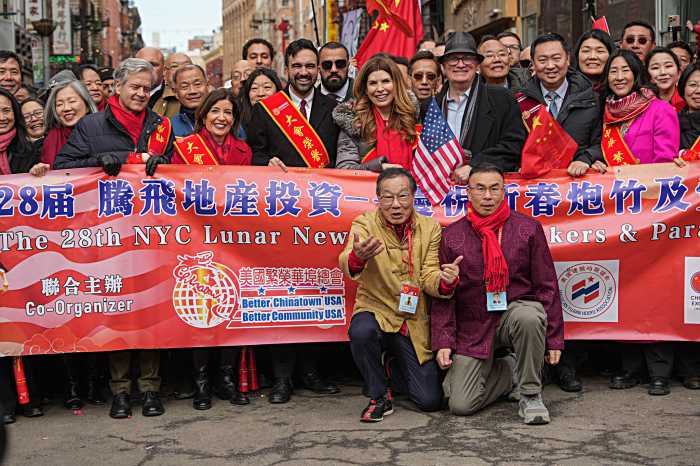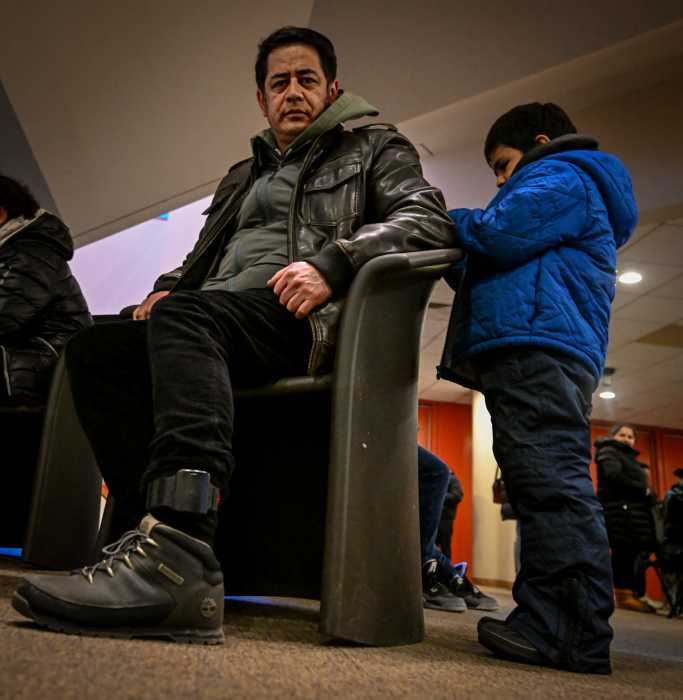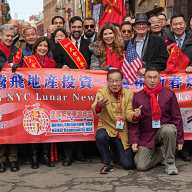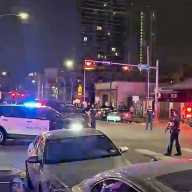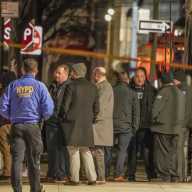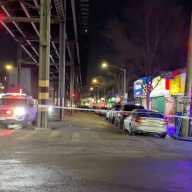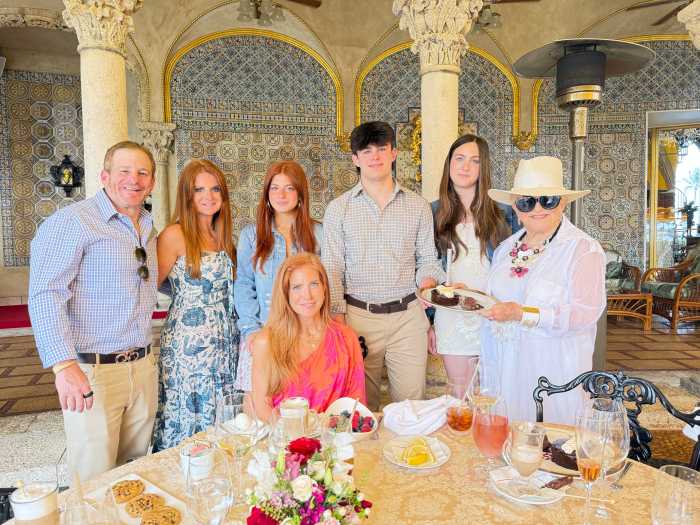BY BONNIE ROSENSTOCK | Dubbed by residents as the “mayor” of West 22nd Street, Claude Rolls died on Wednesday, December 14 at the age of 78 of an apparent heart attack. He was found in his newly bought red van by his friend Kelvin Maharaj around 2:45pm. Efforts by the EMT to revive him were unsuccessful, as he had apparently succumbed sometime before.
When Maharaj discovered Rolls, he was parked a short distance away from his usual spot on the block (a legal length from the hydrant next to Clement Clarke Moore Park), waiting for it to become free. He had just bought the used van that morning in Queens and called Maharaj to look at it when he got back. “When I spotted it, I went over,” said Maharaj. “Because it was new, people didn’t know it was his car.”
Maharaj immediately called Russell Orenstein, who lives at 479. “He said he wanted to die sitting in his car,” related Orenstein. “I saw Claude the night before he died, saying good-night to him as I did almost every night. And while I mourn his loss, I celebrate his life more. He left this earth on the block where he lived, where the people who cared for him could do for him in death what he did for us in life.”
For more than four decades Rolls, who was African-American, had been part of the fabric of the block. He kept a watchful eye on young and old alike from his van, always parked in his designated place (between Ninth and Tenth Avenues). He was there from the crack of dawn until late at night. If and where he went home to sleep is unknown — although he had a storage facility for his tools.
“He wouldn’t say where he lived,” said former daughter-in-law Charmaine Rolls, who was very close to him, and is trying to track down his address through his P.O. Box. “He was a very private person and didn’t like to speak about himself. Nobody had an address for him, but you could always find him on West 22nd Street,” she said.
Charmaine, who had known Rolls since she was 14 (when he lived on West 23rd Street with his dog Zipper) and was later married to his son Kevin, came up from Georgia to identify his body and have his remains cremated. She also saw the impromptu memorial of candles, flowers, cards and remembrances next to where he parked. The majority of his ashes will be interred at Calverton National Cemetery (a U.S. military cemetery on eastern Long Island). Rolls was honorably discharged from the Air Force in 1958 and had burns on his ear from a helicopter crash that melted his helmet. In the spring, Charmaine will return for a planned memorial, planting and the installation of a plaque. Some of Rolls’ ashes will be strewn around the nearby tree bed where he parked his car.
“He was a good person and had a great heart,” said Charmaine. “He didn’t have much contact with other family members. He loved the people in the neighborhood and had great friendships with them for 40 years. They were his family.”
Rolls touched many lives on this brownstone-rowed block, which is part of the Chelsea Historic District. Because there are no doormen buildings, Rolls carved out a niche for himself as super, maintenance man and watchman and was entrusted with the keys to many buildings and cars. He had Orenstein’s keys to both. “I trusted him with everything I had,” he said.
Orenstein met Rolls in 1998. “He walked right up to my mother to introduce himself. From then on, he made sure that the garbage was put out right, so we wouldn’t get a ticket from the Department of Sanitation. He would call if the car needed to be moved. He just watched out for the neighborhood,” Orenstein said. “Bloomberg may have the title, but Claude was the real mayor.”
Karl Haller, owner of Jumper Plumbing & Heating (403 West 21st Street between Ninth and Tenth Avenues) said if the boiler wasn’t working, the owner would say to see Claude, he has the key. “He was a nice human being, which is saying a lot,” said Haller. “When everything else was going to heck and I was having a bad day, Claude would wave to you and smile and give you a moment of good feeling. He was a wonderful, reassuring fixture on the block. I really miss him.”
For the last ten years, Rolls moved Maya Hess’s car from one side of the street to the other. Hess, who knew him for 16 years, said he did it for quite a few people. He also performed other tasks like snow shoveling, watering, accepting FedEx and UPS packages, letting Con Edison in to read the meter. When she went out to get her coffee at 6am, she first walked over to Rolls’ car to talk to him. “He gave me his New York Post every morning even if he hadn’t finished reading it. He was a lovely man. Everybody knew him and trusted him. He was very entrepreneurial. It’s an unusual story of a man who survived here by being kind and helping people. The neighborhood embraced him. I miss him terribly,” she said.
Pamela Wolff called Rolls the “éminence grise presence” that you could count on. “He and I had a longtime conversation going on for 20 years or so about life on 22nd Street. In my experience he was a gentle, humble and caring man. His worst vice was smoking. He kept an eye on doings at 458 and 460, alerting me of any odd events. I’m sure his ubiquitous presence served as a brake on many potential opportunistic crimes. I will miss our rambling semi-philosophical chats. I will remember his pale blue eyes,” Wolff said.
Rolls had Jason Edwards’ phone number and called to alert him when a good parking space was available. Edwards has lived on the block about five years and saw Rolls every day. He related that every time Rolls got rid of a vehicle, he always gave the old one to charity. “He knew from the very wealthy to the poorest in the neighborhood. All the neighborhoods in Manhattan should be so lucky to have a guy like that look after them.” He continued, “Fate led him back where he needed to be, so those of us who knew him would know what happened.”
Hess added that he also had a lot of friends in the local Tenth Police Precinct and would call 911 or the precinct to alert about activities he saw. “Many police officers came by to look at the memorial and asked when there would be a service because they wanted to pay their respects,” she said.
Maureen McElduff, principal of Guardian Angel School (pre-K to grade 8) at 193 Tenth Avenue, was thankful for his presence. She emailed Chelsea Now, “Knowing he was always across the street gave me a sense of security and safety not just for me but for the students in the school. ‘Shorty’ would contact me if there was a problem with any of the children. He would look out for them on the way to school, at dismissal or while at play in the park. It was always an extra reassurance knowing he was there. Although his presence was always there, he was a very quiet, humble, private man and just plain ‘nice.’ One just assumed or took for granted that he would always be there by the park in his car. He will truly be missed.”
Dog walker George Downing, who lives on West 19th Street, recalled that when he came out around 5 or 5:30am to walk the dogs, Rolls flashed his lights to let him know he was watching over him. “We talked every day. The greatest thing was that Claude was himself. He loved life. He died the way he wanted to die — in his car. He was like another St. Francis with the animals. The squirrels ate out of his hand.”
Downing walked Martha Teichner’s dogs. “He loved one of my dogs Minnie, who was a rescue. Every day when George stopped by Claude’s car with Goose and Minnie, she would put her paws up on Claude’s knees and allow him to pet her,” said Teichner, a CBS correspondent. “I feel very sad about Claude’s death. He helped make 22nd Street special.”
Jean Blair said she met Rolls years ago through her dog Phoebe, who has been blind since birth. “Phoebe found Claude because his pockets were always full of dog treats. Within ten minutes, they became fast friends. For the past five years, almost every day I would stop to chat with Claude; Phoebe would do tricks, and he would give her treats and a pet. If she was reluctant to go out, I would say, ‘Want to see Claude?’ and she would jump up and go out,” said Blair. “I can’t imagine the block without him. I felt safer with him there.”
Rolls was born in Oklahoma. He was divorced and is survived by sons Kevin, 51, of South Jersey, Claude, Jr., 54 of South Carolina, Andrew, 48, daughters-in-law, three grandsons, four granddaughters and four great grandsons.
As treasurer of the West 400 Block Association, Karen Jacob is spearheading a drive to raise funds for a plaque in Claude’s honor on the tree pit that was near his car. Cash is acceptable — or make check payable to the “West 400 Block Association,” indicating it is for Claude and mail to Karen Jacob, 439 West 22nd Street (or slide the donation under her inner door). Jacob estimated that around $500 would be needed. She recalled that several years ago when her daughter graduated from high school, she had a party for her. On the guest list were people who had touched her daughter’s life — one of them was Claude. “He will be missed,” Jacob said.



